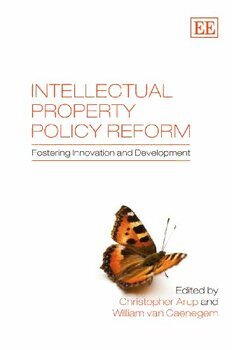
Intellectual Property Policy Reform: Fostering Innovation and Development PDF
333 Pages·2009·1.188 MB·English
Most books are stored in the elastic cloud where traffic is expensive. For this reason, we have a limit on daily download.
Preview Intellectual Property Policy Reform: Fostering Innovation and Development
Description:
This state-of-the-art study argues that reforms to intellectual property (IP) should be based on the ways IP is interacting with new technologies, business models, work patterns and social mores. It identifies emerging IP reform proposals and experiments, indicating first how more rigor and independence can be built into the grant of IP rights so that genuine innovations are recognized. The original contributions illustrate how IP rights can be utilised, through open source licensing systems and private transfers, to disseminate knowledge. It also recommends reforms. The discussion takes in patents, copyright, trade secrets and relational obligations, considering the design of legislative directives, default principles, administrative practices, contractual terms and license specifications. Providing contemporary empirical studies and covering public administration, collective and open approaches, and regulation of private transactions, this comprehensive book will prove a stimulating read for academics and students of law, business and management and development studies. Government policy makers and regulators as well as IP managers and advocates will also find much to provoke thought.
See more
The list of books you might like
Most books are stored in the elastic cloud where traffic is expensive. For this reason, we have a limit on daily download.
